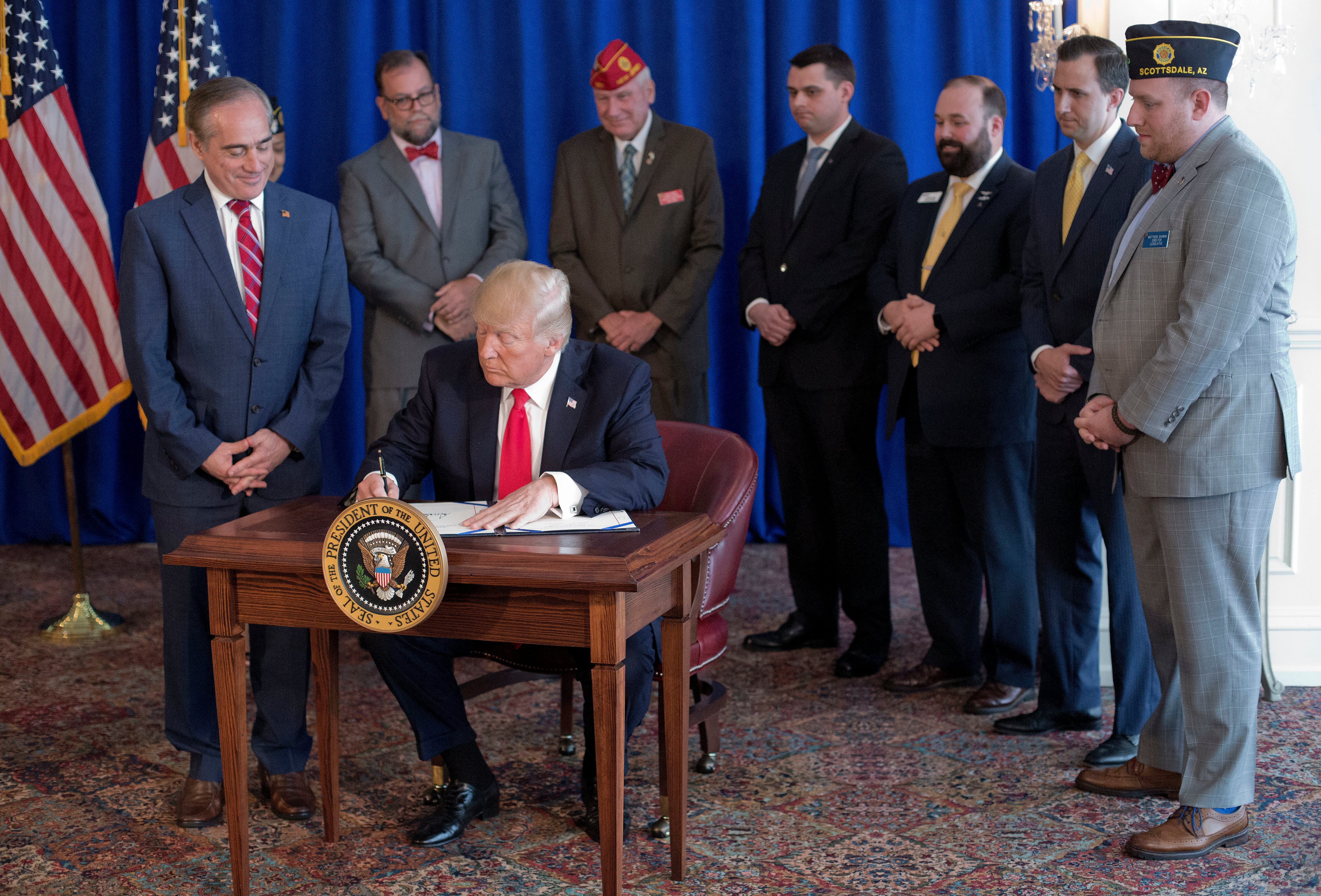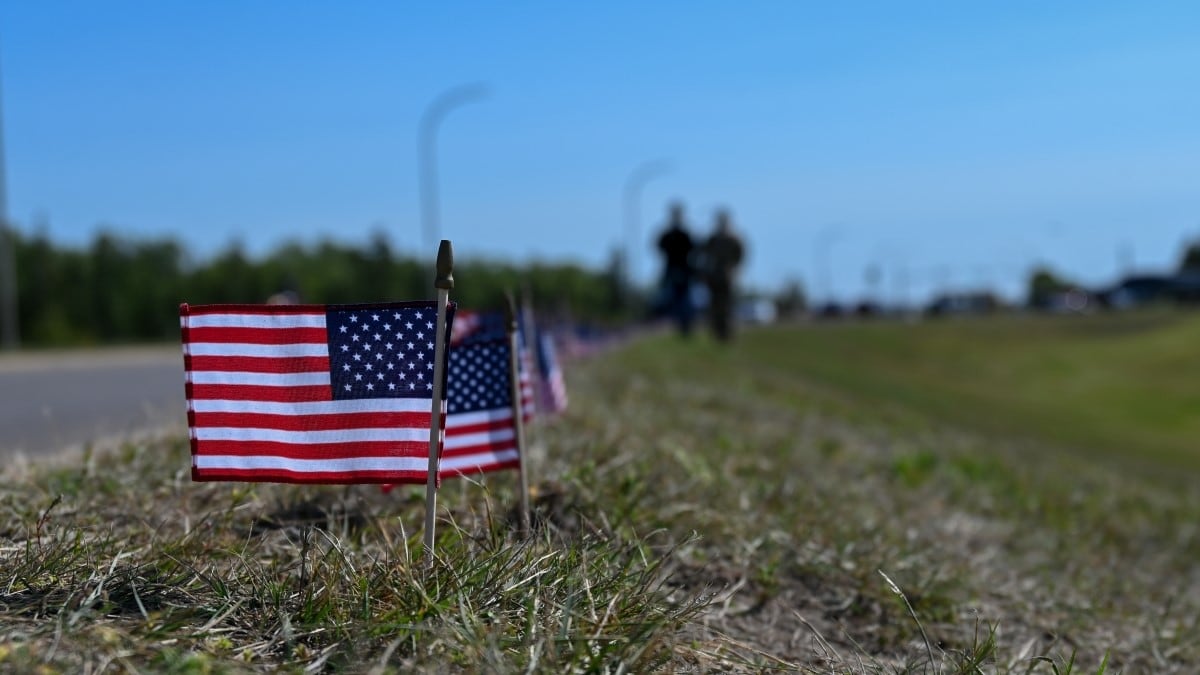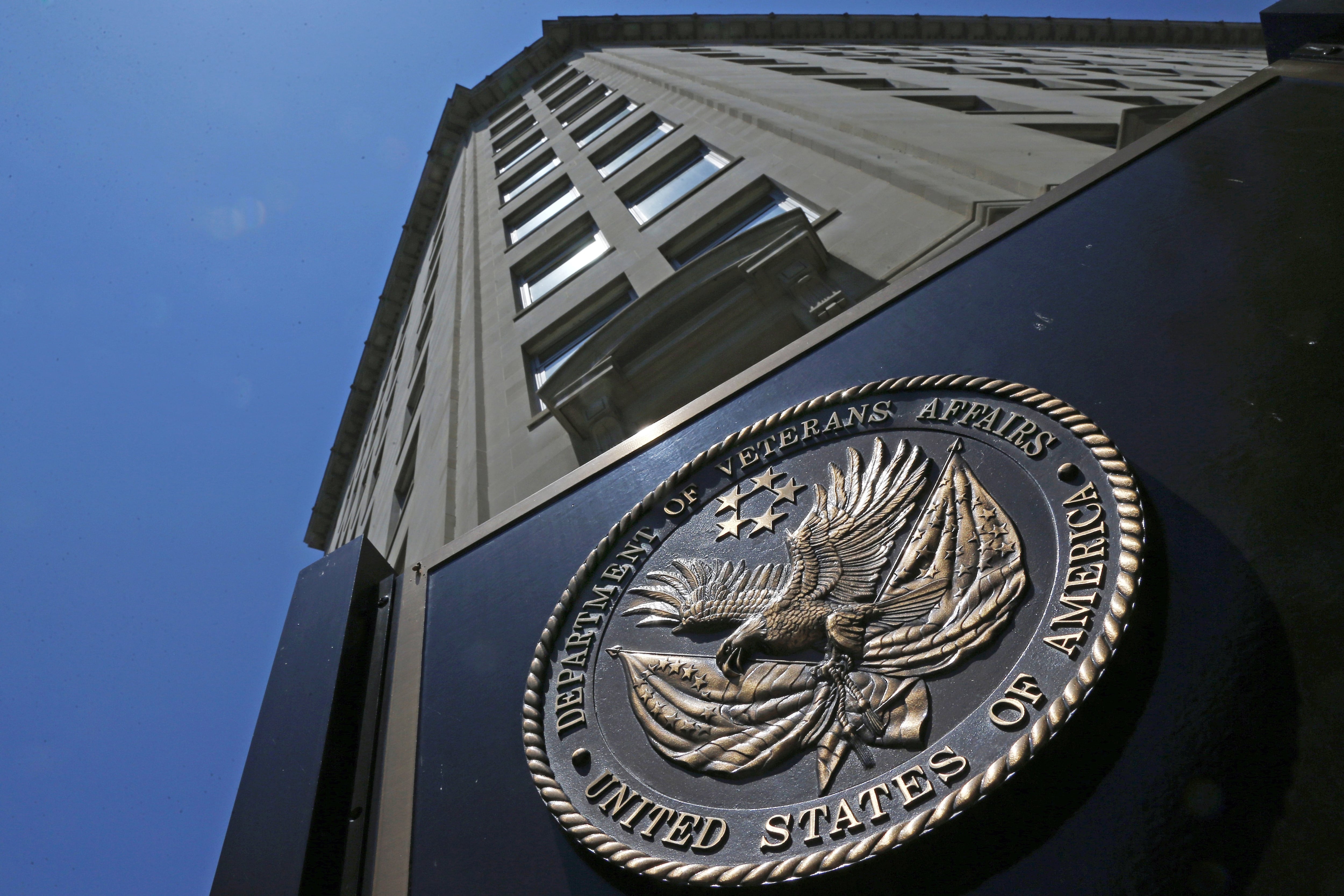As the president prepares to address the American Legion’s annual convention, his policy successes don’t amount to the overwhelming victories claimed by his supporters.
WASHINGTON — When President Donald Trump addresses the American Legion national convention in Nevada on Wednesday, he’ll likely repeat the lengthy list of veterans accomplishments that he has chronicled at a host of events this summer.
But the list of clear-cut wins for this administration on Department of Veterans Affairs issues is considerably shorter than what the president has trumpeted.
Veterans issues are being touted both inside the White House and outside the administration as an area of significant successes for Trump. Earlier this month, Trump said his staff has done “record-setting business” at the VA in his first seven months in office, with more advances to come.
This White House can claim big changes on accountability rules at the VA, which make it easier to fire under-performing employees, and the Trump administration has also established a new hotline for veterans complaints.
However, other proclaimed advances on private-sector health care for veterans, medical records sharing with the Defense Department and new telehealth services within the VA amount to minimal changes in existing programs, not Trump-inspired innovations.
And in the case of the recent GI Bill changes — praised by the veterans community as a major benefits expansion for tens of thousands of veterans — Trump’s only real contribution was signing into law a deal that was reached by lawmakers on Capitol Hill.
The biggest part of what Trump has labeled “our many legislative successes” on veterans issues has been action from the Republican-controlled House and Senate. Issues like benefit appeals reform and accountability were discussed in recent years, but never finalized for then-President Barack Obama to sign into law.
Here are some of the successes Trump is likely to discuss during his American Legion appearance Wednesday, and the background on what has actually changed on each issue:
Accountability
The biggest change Trump has brought so far to the VA is new accountability rules, making it easier to fire workers within the department.
At a veterans event earlier this month, Trump said the changes “have been in the making for 40 years” but that previous administrations “weren’t able to get it approved.”
Republicans on Capitol Hill have pursued the idea for the last three years with limited success, passing a measure that was supposed to make dismissing senior executives at the VA a quicker, less cumbersome process. After two years, that measure was abandoned due legal concerns about its constitutionality.
But the new legislation signed into law in June replaced that with an expedited firing process for misbehaving employees, a mechanism for stripping those workers of ill-gotten bonuses, and new protections for whistleblowers.
Union groups and Democratic critics have questioned the wider value of the program, saying that simply firing workers more quickly won’t improve overall service at the VA. But department Secretary David Shulkin has repeatedly said keeping under-performing workers on the payroll hurts both morale and public opinion of the bureaucracy
Trump officials have also established a new Office of Accountability and Whistleblower Protection within the VA to better root out problem workers.
Since Trump took office, more than 700 workers have been fired from department posts, most before the new rules were put in place. VA has more than 350,000 workers across the country.
VA Choice
Trump has signed into law two bills on the controversial VA Choice program in recent months, both times stating that the moves will give more veterans a chance to seek private-sector health care at the government’s expense.
“Why can’t they go out and see a doctor?” Trump asked at a Choice bill signing earlier this month. “If they have to wait seven days or 14 days in line, why can’t they see a doctor, and we’ll pay for the cost of the doctor? That’s going to be a lot less expensive, but, more importantly, you’re going to have immediate medical care for our veterans.”
“That’s what we’re doing.”
But neither of the bills Trump signed on the Choice program created new rules for veterans’ outside care options. Rather, the measures extended and stabilized existing programs, allowing select veterans to continue using existing services.
The Choice program — one in a series of VA community care offerings that pre-date the Trump administration — pays for medical visits of veterans to private-sector physicians if those patients face a 30-day wait or a 40-mile travel to VA facilities.
About one-third of all VA-funded medical appointments happened outside department clinics and hospitals before Trump took office. That number could rise significantly in years to come if other Trump-promised changes become law, but so far those proposals are still under debate.
Veterans medical records
Similarly, Trump has touted plans to create “seamless care between the Departments of Defense and Veteran Affairs” as a new initiative for his administration. Yet that same idea was one of the high-profile goals outlined by Obama in 2009 (and by VA secretaries before his presidency).
In June, Shulkin announced plans to shift veterans’ electronic medical records to the same system used by the Defense Department, potentially bridging a long-problematic gap in continuous medical care for troops as they separate from the military and start seeking care at the VA.
While the announcement alone was significant — DoD and VA have fought for years over the most appropriate system for shared medical records — any actual results of the new plan are still years away. Implementation plans won’t be finalized until the end of 2017.
He has similarly touted a new VA website showing wait-times data for all department facilities as a game-changer for transparency in government. The site allows veterans to see the average appointment delays at every hospital and clinic nationwide.
VA officials unveiled the site in April, but said that work on the effort began during the previous administration.
White House hotline
One of Trump’s signature campaign promises was to set up “a private White House hotline, which will be active 24 hours a day answered by a real person” for veterans to voice their complaints about VA personnel and operations.
That hotline — available at 855-948-2311 between the hours of 8 a.m. and 5 p.m. EDT — launched in June. It’s expected to expand to 24-hour coverage this fall, after more veterans are hired to staff the operation.
Yet the hotline is largely disconnected from the White House. VA officials are funding, staffing and setting procedures for the call center. White House officials are deferring all questions on the hotline to the VA.
VA officials said the hotline receives about 1,200 calls a week, and that follow-ups are promised to anyone calling with specific concerns or difficulties if callers provide their personal information.
GI Bill expansion
When Trump signed the “Forever GI Bill” legislation into law earlier this month, he did so with little fanfare despite significant excitement among the veterans community at the legislation.
The measure removes the expiration date for Post-9/11 GI Bill benefits. It expands eligibility for reservists and Purple Heart recipients. It offers new protections for students whose schools experience financial problems during their studies. And the new law offers more tuition money for science and technology degree programs.
It represents the culmination of years of work by lawmakers on Capitol Hill, much of which was done without much input from the White House.
Republican and Democratic lawmakers huddled with veterans groups over how to pay for the $3 billion expansion and which changes to include, with negotiations breaking down and restarting multiple times in the last three years.
In the end, groups involved with the work praised Congress for the success and quietly expressed disappointment that the president didn’t better highlight the victory.
VA staffing
Another of Trump’s campaign promises for the VA was to appoint a new secretary “whose sole purpose will be to serve veterans.” Shulkin was confirmed 100-0 by the Senate, a sign of bipartisan support.
But Trump’s broader promise of stocking federal departments with qualified leaders remains largely unfilled.
Nominees for the permanent heads of the VA’s benefits and health care systems were expected before the start of the summer, but no nominees have been selected yet. The undersecretary for memorial affairs post is also currently manned by an acting official, awaiting a permanent replacement.
Leaders on Capitol Hill have criticized the slow pace of nominees from the White House, saying it compromises Trump’s ability to affect systemic changes by leaving career bureaucrats in place within federal departments.
But VA officials have pushed back against those criticisms, saying that reforms are being put in place by Shulkin, himself a holdover from the Obama administration.
Benefits appeals reform
Appeals reform was a major goal of not just Shulkin but his predecessor, former VA Secretary Bob McDonald. The plan passed by Congress this year was almost identical to ones presented to lawmakers last year which stalled out for political reasons.
Trump is expected to sign a major overhaul to the veterans benefits appeals process during the American Legion appearance Wednesday, fitting given the group’s significant work on the issue in recent years.
Along with fellow veterans organizations, the Legion helped craft a new appeals process which will speed up the time needed to process appeals by setting limits on how some supplementary information can be submitted. The hope is a significant drop in the average wait time for those cases, which now tops five years.
Leo covers Congress, Veterans Affairs and the White House for Military Times. He has covered Washington, D.C. since 2004, focusing on military personnel and veterans policies. His work has earned numerous honors, including a 2009 Polk award, a 2010 National Headliner Award, the IAVA Leadership in Journalism award and the VFW News Media award.




